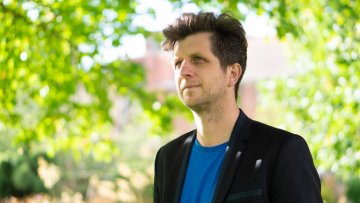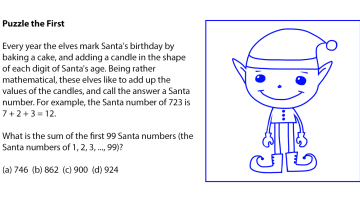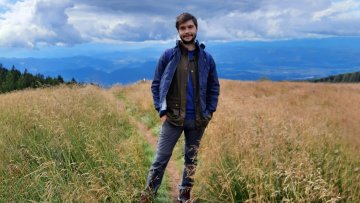Network Science provides generic tools to model and analyse systems in a broad range of disciplines, including biology, computer science and sociology. Renaud Lambiotte (pictured) teaches a 4th year undergraduate course on Networks and we are making the whole course available via our YouTube Channel. The first lecture is below with seven more to follow over the next few weeks.
There is no doubt about it, Santa is a mathematician. He must be, having every year to calculate the best way to get presents to so many homes in such a short space of time.
So in homage to such genius, we have two Santa themed puzzles for you to solve. You can find the answers at the bottom of the page (but try not to look too quickly).
15:30
Some applications of the geometry of surfaces to Biology
Abstract
Abstract: Almost everything we encounter in our 3-dimensional world is a surface - the outside of a solid object. Comparing the shapes of surfaces is, not surprisingly, a fundamental problem in both theoretical and applied mathematics. Results from the mathematical theory of surfaces are now being used to study objects such as bones, brain cortices, proteins and biomolecules. This talk will discuss recent joint work with Patrice Koehl that introduces a new metric on the space of Riemannian surfaces of genus-zero and some applications to biological surfaces.
15:30
The centres of String 2-groups
Abstract
Let $G$ be a compact connected Lie group and $k \in H^4(BG,\mathbb{Z})$ a cohomology class. The String 2-group $G_k$ is the central extension of $G$ by the smooth 2-group $BU(1)$ classified by $k$. It has a close relationship to the level $k$ extension of the loop group $LG$.
We will introduce smooth 2-groups and the associated notion of centre. We then compute this centre for the String 2-groups, leveraging the power of maximal tori familiar from classical Lie theory.
The centre turns out to recover the invertible positive energy representations of $LG$ at level $k$ (as long as we exclude factors of $E_8$ at level 2).
15:30
Trisected 4-manifolds and link surgery
Abstract
Gay and Kirby formulated a new way to decompose a (closed, orientable) 4-manifold M, called a trisection. I’ll describe how to translate from a classical framed link diagram for M to a trisection diagram. The links so obtained lie on Heegaard surfaces in the 3-sphere, and have surgeries yielding some number of copies of S^1XS^2. We can describe families of “elementary" links which have such surgeries, and one can ask whether all links with few components having such surgeries lie in these families. The answer is almost certainly no. We nevertheless give a small piece of evidence in favor of a positive answer for a special family of 2-component links. This is joint work with Rob Kirby. Gay and Kirby formulated a new way to decompose a (closed, orientable) 4-manifold M, called a trisection. I’ll describe how to translate from a classical framed link diagram for M to a trisection diagram. The links so obtained lie on Heegaard surfaces in the 3-sphere, and have surgeries yielding some number of copies of S^1XS^2. We can describe families of “elementary" links which have such surgeries, and one can ask whether all links with few components having such surgeries lie in these families. The answer is almost certainly no. We nevertheless give a small piece of evidence in favor of a positive answer for a special family of 2-component links. This is joint work with Rob Kirby.
15:30
Rigidity of minimal Lagrangian diffeomorphisms between spherical cone surfaces
Abstract
Minimal Lagrangian maps play an important role in Teichmüller theory, with important existence and uniqueness results for hyperbolic surfaces obtained by Labourie, Schoen, Bonsante-Schlenker, Toulisse and others. In positive curvature, it is thus natural to ask whether one can find minimal Lagrangian diffeomorphisms between two spherical surfaces with cone points. In this talk we will show that the answer is negative, unless the two surfaces are isometric. As an application, we obtain a generalization of Liebmann’s theorem for branched immersions of constant curvature in Euclidean space. This is joint work with Christian El Emam.
15:30
Free-by-cyclic groups and their automorphisms
Abstract
Free-by-cyclic groups are easy to define – all you need is an automorphism of F_n. Their properties (for example hyperbolicity, or relative hyperbolicity) depend on this defining automorphism, but not always transparently. I will introduce these groups and some of their properties, and connect some to properties of the defining automorphism. I'll then discuss some ideas and techniques we can use to understand their automorphisms, including finding useful actions on trees and relationships with certain subgroups of Out(F_n). (This is joint work with Armando Martino.)
15:30
Localization and decomposition
Abstract
Let X be a closed Riemannian manifold, and represent the algebra C(X) of continuous functions on X on the Hilbert space L^2(X) by multiplication. Inspired by the heat kernel proof of the Atiyah-Singer index theorem, I'll explain how to describe K-homology (i.e. the dual theory to Atiyah-Hirzebruch K-theory) in terms of parametrized families of operators on L^2(X) that get more and more 'local' in X as time tends to infinity.
I'll then switch perspectives from C(X) -- the prototypical example of a commutative C*-algebra -- to noncommutative C*-algebras coming from discrete groups, and explain how the underlying large-scale geometry of the groups can give rise to approximate 'decompositions' of the C*-algebras. I'll then explain how to use these decompositions and localization in the sense above to compute K-homology, and the connection to some conjectures in topology, geometry, and C*-algebra theory.
15:30
Deformations of ordinary Calabi-Yau varieties
Abstract
Over the complex numbers, the Bomolgorov-Tian-Todorev theorem asserts that Calabi-Yau varieties have unobstructed deformations, so any n^{th} order deformation extends to higher order. We prove an analogue of this statement for the nicest kind of Calabi-Yau varieties in characteristic p, namely ordinary ones, using derived algebraic geometry. In fact, we produce canonical lifts to characteristic zero, thereby generalising results of Serre-Tate, Deligne-Nygaard, Ward, and Achinger-Zdanowic. This is joint work with Taelman.




